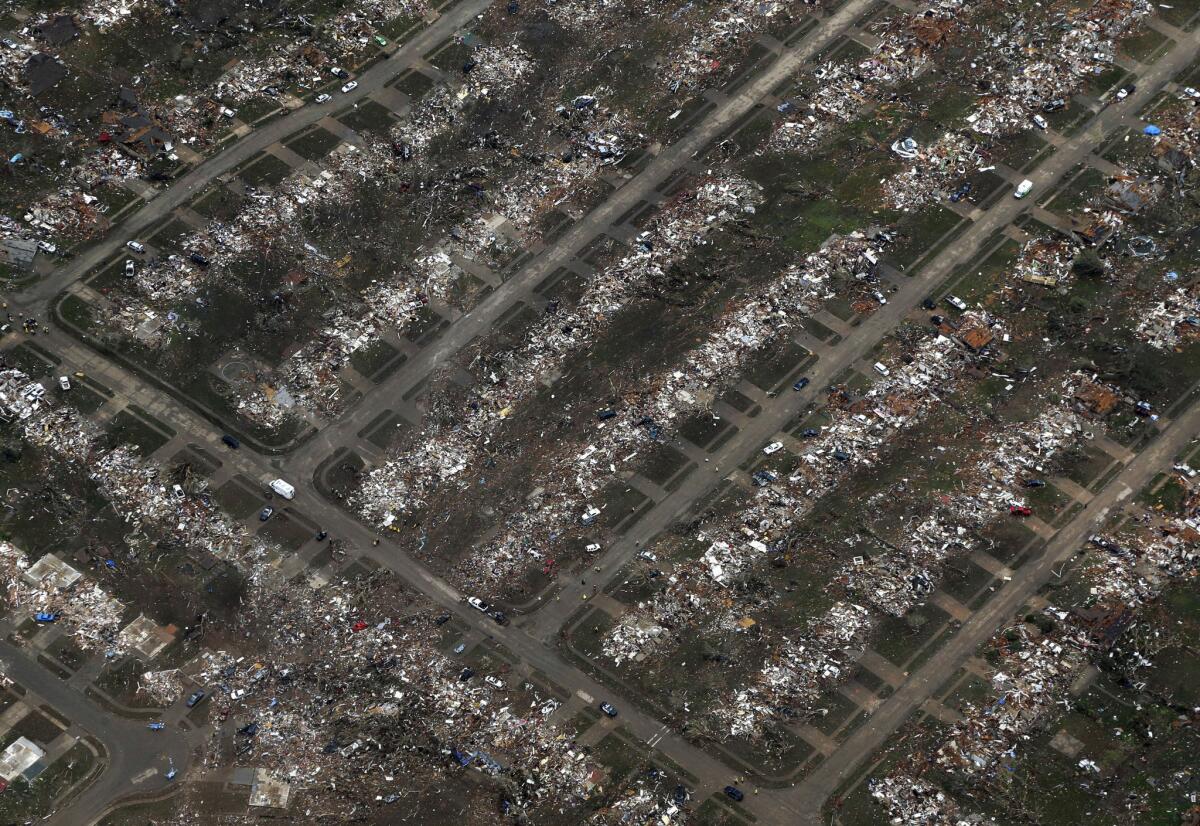Oklahoma lawmakers who opposed disaster aid now face own disaster

- Share via
WASHINGTON -- When $50 billion in disaster aid for victims of Superstorm Sandy came before Congress this year, three of Oklahoma’s five representatives and both of its senators were among the “no” votes.
At the time, some of the Oklahoma lawmakers demanded spending cuts as a condition of aid to the hurricane-ravaged Northeast.
Now that a devastating tornado has hit their state, it’s not clear whether Oklahoma lawmakers who demanded budget cuts will continue to hold that line when it comes to their state’s recovery efforts.
“When we increase spending in one area, we must cut spending in another area,” Rep. Jim Bridenstine (R-Okla.) said in January. “I hope my colleagues will consider this principle in future relief packages.”
Oklahoma Reps. Markwayne Mullin and James Lankford, both Republicans, also voted against the $50-billion aid package.
PHOTOS: Powerful tornado slams Oklahoma
During the debate, Rep. Frank A. LoBiondo (R-N.J.) warned colleagues from disaster-prone regions to think hard before seeking to impose conditions on relief.
But a majority of Republicans voted against the package, which passed the House, 241 to 180, after New Jersey Gov. Chris Christie delivered a tongue lashing to Speaker John Boehner (R-Ohio) for the delay.
Oklahoma’s Republican Sens. Tom Coburn, who is a physician, and James Inhofe also opposed the measure when it passed the Senate, 62 to 36.
“If an additional emergency aid package is necessary, Dr. Coburn will not change his long-standing position on offsets,” said spokesman John Hart, whose boss was headed to Oklahoma to assess the damage.
“We don’t know if an emergency aid package will even be necessary,” Hart said, noting that the Federal Emergency Management Agency has $11 billion in its disaster relief fund.
Officials have not yet estimated the cost of tornado disaster recovery.
“If the choice is between borrowing and reducing spending on largesse, we should divert funds from largesse to victims,” Hart said. He said Coburn opposed disaster aid bills in the past because “he believes disaster funding should be used to pay for disasters, not a wish list of parochial or backlogged priorities that have nothing to do with helping victims.”
During the debate on Sandy aid, a number of Republican lawmakers challenged whether spending for such things as shoring up defenses against future storms was an emergency, saying that should be considered during the normal budget process.
Coburn bristled at the spending debate so soon after the disaster.
“Funding Q’s show the crassness of DC over the sensitivity we need for OK. Focus is first on recovery & families,” he tweeted.
The issue exposed differences within the GOP ranks Tuesday as President Obama pledged the full resources of the federal government and Gov. Mary Fallin promised quick aid response.
When asked about cuts as a condition of aid, Boehner said only, “We’ll work with the administration on making sure that they have the resources they need to help the people of Oklahoma.”
A spokesman for Lankford said the spending debate was “the furthest thing from his mind right now.” The other “no” votes on Sandy aid, Bridenstine and Mullin, could not be reached.
Disaster relief traditionally draws strong bipartisan support. But with Washington awash in red ink, conservative lawmakers have pushed to offset new spending with cuts elsewhere in the budget.
Rep. Tom Cole (R-Okla.), whose hometown of Moore was ravaged by the tornado, supported the Sandy aid, as did Rep. Frank Lucas (R-Okla.).
Cole said he told Northeastern officials after Sandy that “we’re always going to be there to help because we’re always one tornado away from being Joplin,” a reference to the devastating 2011 tornado in Missouri, according to an interview on MSNBC.
“I didn’t think it was going to be quite this soon,” he added.
Rep. Harold Rogers (R-Ky.), the influential chairman of the House Appropriations Committee, told reporters in a Capitol hallway that he did not believe disaster aid should be offset by spending cuts.
“We have an obligation to help those people,” he said.
ALSO:
Oklahoma tornado: Reporter’s tweets from the scene
Rescue efforts ongoing as grim scene emerges after tornado
After devastating Oklahoma tornado, a desperate search for friend
More to Read
Sign up for Essential California
The most important California stories and recommendations in your inbox every morning.
You may occasionally receive promotional content from the Los Angeles Times.














